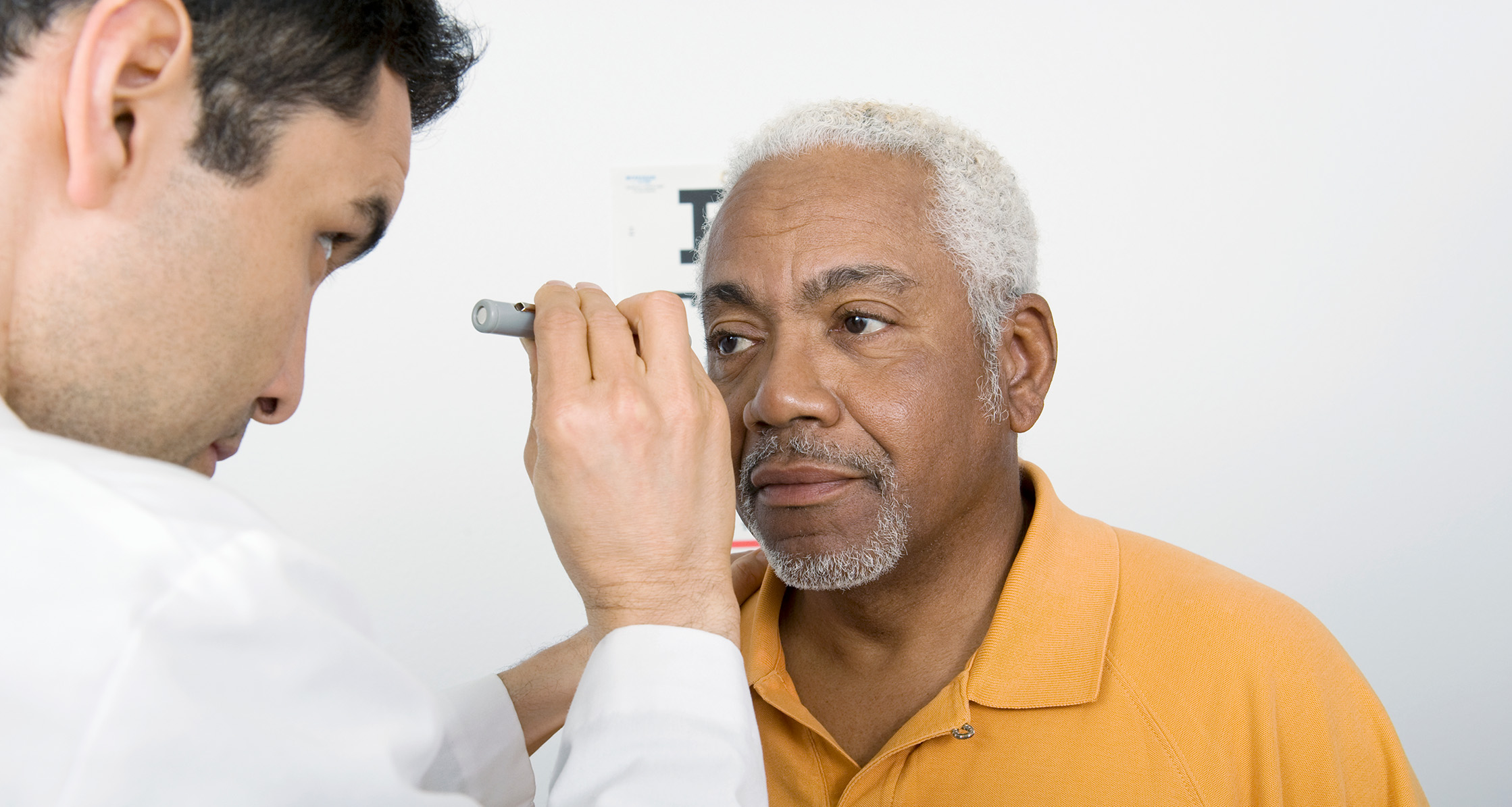The CDC estimates that half of visual impairment and blindness can be prevented through early diagnosis and timely treatment.
When it comes to health care, most of us understand the importance of seeing a doctor on a regular basis. But what about a visit to the eye doctor? How many of us skip this important part of our health care?
According to the Centers for Disease Control and Prevention (CDC), only half of the adults in the United States at high risk for vision loss have visited an eye doctor in the past 12 months.
Regular eye exams and eye care can have a major impact on your overall health and wellness. Eye exams can detect and prevent vision loss, ensure your eyes are healthy and spot other health problems as well, like diabetes, high blood pressure and more.
Check out the information below to learn more about common eye conditions affecting Veterans, as well as the steps you can take to keep your eyes healthy.
What Are the Most Common Eye Conditions Affecting Veterans?
According to the CDC, the leading causes of blindness and low vision in the United States are primarily age-related and include:
- Glaucoma – a group of diseases that can damage the eye’s optic nerve and result in vision loss and blindness
- Diabetic retinopathy – a common complication of diabetes characterized by progressive damage to the blood vessels of the retina
- Macular degeneration – an eye disorder associated with aging that results in damaging sharp and central vision
- Cataract – a clouding of the eye’s lens that can occur at any age for a variety of reasons
According to research on vision loss by the Department of Veterans Affairs (VA), the conditions listed above are the most common eye issues facing Veterans as well.
However, there are additional concerns Veterans face when it comes to eye health, including direct injuries to the eye and blast-related brain injuries. Shrapnel, roadside bombs and bomb fragments have been responsible for many eye injuries to Service members in recent years. In addition, blast-related brain injuries can be followed by vision problems such as blurred vision, double vision, sensitivity to light and difficulty reading. VA estimates that as many as 64% of Service members with traumatic brain injuries (TBIs) also have vision problems.
What Do the Experts Say?
 Dr. Jesse V. Dominguez has worked as an optometrist in Phoenix since 2015, serving Veterans under the VA Community Care Network. He understands firsthand the importance of regular eye care as a way to keep your vision strong and your eyes healthy.
Dr. Jesse V. Dominguez has worked as an optometrist in Phoenix since 2015, serving Veterans under the VA Community Care Network. He understands firsthand the importance of regular eye care as a way to keep your vision strong and your eyes healthy.
Dr. Dominguez shares, “There are so many illnesses that can be treated and controlled if caught early. With a simple and painless wellness eye examination, we can detect, treat and prevent most problems or direct patients to coordinating specialties.”
Dr. Dominguez’s own patients have come to understand the importance of regular eye care. He recalls a Veteran putting it this way: “We get our teeth cleaned twice a year like clockwork, yet we can get false teeth not false eyes.”
To learn more about Dr. Dominguez and the work he does on behalf of Veterans, check out Dr. Jesse Dominguez Believes Every Day Is Veterans Day.
What Steps Can I Take to Protect My Eye Health?
According to experts like Dr. Dominguez, as well as the CDC, it’s estimated that half of visual impairment and blindness can be prevented through early diagnosis and timely treatment. The CDC offers some simple guidelines and tips to help you keep your eyes healthy.
 Get your eyes examined regularly. Even if you don’t have any concerns, it’s important to get a dilated eye exam once a year. Many common eye diseases, such as glaucoma, diabetic eye disease and macular degeneration, often have no warning signs and can only be detected through a dilated eye exam. It’s a simple and painless examination that can reveal so much about your eyes and their health.
Get your eyes examined regularly. Even if you don’t have any concerns, it’s important to get a dilated eye exam once a year. Many common eye diseases, such as glaucoma, diabetic eye disease and macular degeneration, often have no warning signs and can only be detected through a dilated eye exam. It’s a simple and painless examination that can reveal so much about your eyes and their health.- Discuss your overall health with your eye doctor. Your eye health is connected in many ways to your overall health and wellness, so let your eye doctor know all you can about your health. For example, if you have diabetes, talk to your eye doctor about your care. Good management of diabetes can reduce the progression of diabetic retinopathy. In addition, if you’ve suffered a TBI, let your eye doctor know. You can discuss any symptoms you’re experiencing and monitor your vision and eye health closely.
- Understand your risk factors. Different people may be more likely to get certain eye diseases, so it’s important to understand what your personal risk factors are. For example, African Americans are at greater risk for cataracts and glaucoma, while white women have a greater risk of developing macular degeneration.
- Know your family history. Many eye conditions are hereditary, so it’s important to know if anyone in your family has had a particular eye condition or disease. This information can help you determine your risk level for certain diseases.
- Maintain a healthy weight. Being overweight or obese increases your risk of developing diabetic eye disease and glaucoma.
- Keep your blood sugar levels under control. The CDC estimates that 90% of blindness caused by diabetes is preventable. By managing your blood sugar, blood pressure and cholesterol levels, you can reduce your risk for vision loss related to diabetes. Check out Diabetes: How Healthy Habits Can Make a Big Difference for more information on diabetes care.
- Protect your eyes. Wear safety goggles while working or playing sports and use sunglasses to protect your eyes from ultra-violet light that can damage your eyes.
- Quit smoking. Smoking has been linked to an increased risk of certain eye diseases, such as age-related macular degeneration, cataracts and optic nerve damage. Check out Make a Plan You Can Stick To: Quit Smoking Today for some tips on how to get started.
- Take eye breaks. If you spend a lot of time staring at a computer, you can forget to blink or give your eyes a rest. Experts recommend the 20-20-20 rule: Every 20 minutes, look away about 20 feet in front of you for 20 seconds to reduce eye strain.
What Resources Are Available for Eye Care?
If you qualify for VA health care benefits, you may be able to get some or all of your vision care through VA. Routine eye exams and preventive vision testing are covered under VA health care benefits. When you’re ready, your VA health care provider can help you schedule an eye exam.
Veterans with vision loss that can’t be corrected with regular eyeglasses or who are having difficulty with everyday tasks can reach out to the Visual Impairment Services Team Coordinator in the nearest VA center. VA has an extensive network of low-vision rehabilitation programs to help blind and low-vision Veterans improve their level of functioning. Check out the Blind and Visual Impairment Rehabilitation Services page for more information.
If you don’t qualify for VA benefits, check out the National Eye Institute for a list of programs that offer free or low-cost eye care. The National Eye Institute also offers a list of common eye conditions and diseases if you want more information on something specific.
If you haven’t made an appointment for your annual eye exam, make sure you do! Your eyes and your health are counting on it.







